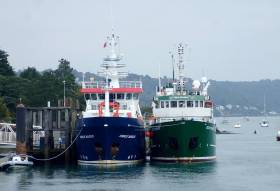Displaying items by tag: Bangor University
Wreck of Ship That Sent Iceberg Warning to Titanic Found in Irish Sea
The ship which sent an iceberg warning to the RMS Titanic, before the ocean liner sank, has been identified lying in the Irish Sea by researchers from Bangor University in Wales.
In 1912 the merchant steamship SS Mesaba was crossing the Atlantic and sent a warning radio message to the RMS Titanic. The message was received, but never reached the bridge.
Later that night, the supposedly unsinkable Titanic hit an iceberg and sank on her maiden voyage, taking 1,500 lives and becoming the world’s most infamous shipwreck.
The SS Mesaba continued as a merchant ship over the next six years before being torpedoed while in convoy in 1918.
Using state-of-the art multibeam sonar mounted on Bangor University’s research vessel Prince Madog, researchers have finally been able to positively identify the wreck and have revealed her position for the first time.
 The merchant ship SS Mesaba which radioed an iceberg warning to the RMS Titanic | Credit: State Library of Queensland
The merchant ship SS Mesaba which radioed an iceberg warning to the RMS Titanic | Credit: State Library of Queensland
“For the marine archaeologist, multibeam sonar has the potential to be as impactful as the use of aerial photography was for landscape archaeology,” the university says.
Multibeam sonar enables seabed mapping of such detail that superstructure details can be revealed on the sonar images, it adds.
The SS Mesaba was one among 273 shipwrecks lying in 7,500 square miles of Irish Sea which were scanned and cross-referenced against the UK Hydrographic Office’s database of wrecks and other sources.
It was thought that 101 wrecks were unidentified, but the number of newly identified wrecks was far higher, as many — the SS Mesaba included — had been wrongly identified in the past.
Details of all the wrecks have been published in a new book, Echoes from the Deep by Dr Innes McCartney of Bangor University, conducted under a Leverhulme Fellowship while at Bournemouth University.
Dr McCartney said: “The results of the work described in the book has validated the multidisciplinary technique employed and it is a ‘game-changer’ for marine archaeology.
 Bangor University’s purpose-built research vessel Prince Madog
Bangor University’s purpose-built research vessel Prince Madog
“Previously we would be able to dive to a few sites a year to visually identify wrecks. The Prince Madog’s unique sonar capabilities has enabled us to develop a relatively low-cost means of examining the wrecks. We can connect this back to the historical information without costly physical interaction with each site.
“It should be of key interest to marine scientists, environmental agencies, hydrographers, heritage managers, maritime archaeologists and historians.”
Dr Michael Roberts, who led the sonar surveys at the university’s School of Ocean Sciences, said: “The expertise and unique resources we have at Bangor University, such as the Prince Madog enable us to deliver high-quality scientific research in an extremely cost-effective manner.
“Identifying shipwrecks such as those documented in the publication for historical research and environmental impact studies is just one example of this.
“We have also been examining these wreck sites to better understand how objects on the seabed interact with physical and biological processes, which in turn can help scientists support the development and growth of the marine energy sector.”
Welsh Government Should Do "Everything They Can" to Save Research Ship Used by Bangor University
#marinescience - The Welsh Government should do "everything they can" to save a research ship used by Bangor University and utilise it as a National Research Vessel for Wales, according to Ynys Môn Assembly Member Rhun ap Iorwerth.
As the North Wales Chronicle writes there is an agreement in place between Bangor University and P&O, who own the Prince Madog ship, regarding the future of the vessel until 2021. However, what future it has beyond that time is unclear at present.
This uncertainty has led to Mr ap Iorwerth proposing the vessel be adopted as Wales’ National Research Vessel following the conclusion of the current agreement.
The Plaid Cymru AM led a short debate in the Assembly in Cardiff on the future of the research vessel last year, with Welsh Government officials having recently met with Bangor University and P&O as a result.
Talks regarding the future of the vessel had proved productive, only for Welsh Government procurement rules to prevent further progress.
To read more including a question raised by Rhun ap Iorwerth.in the Welsh Assembly Chamber read here.
Afloat adds the article refers to P&O, this is in fact P&O Maritime, a solutions provider to governments, businesses and organisations across the world. Among its global network of offices is an Irish base located in Galway.
Last year P&O Maritime Ireland was awarded a 7 year contract from the Marine Institute of Rinville, Oranmore in Co. Galway, to provide operational, management and technical support for the operation of the RV Celtic Voyager and the larger RV Celtic Explorer.
In addition the contract includes the deep-water Remotely Operated Vehicle Holland 1 together with management and technical support to related research and development programmes.





























































